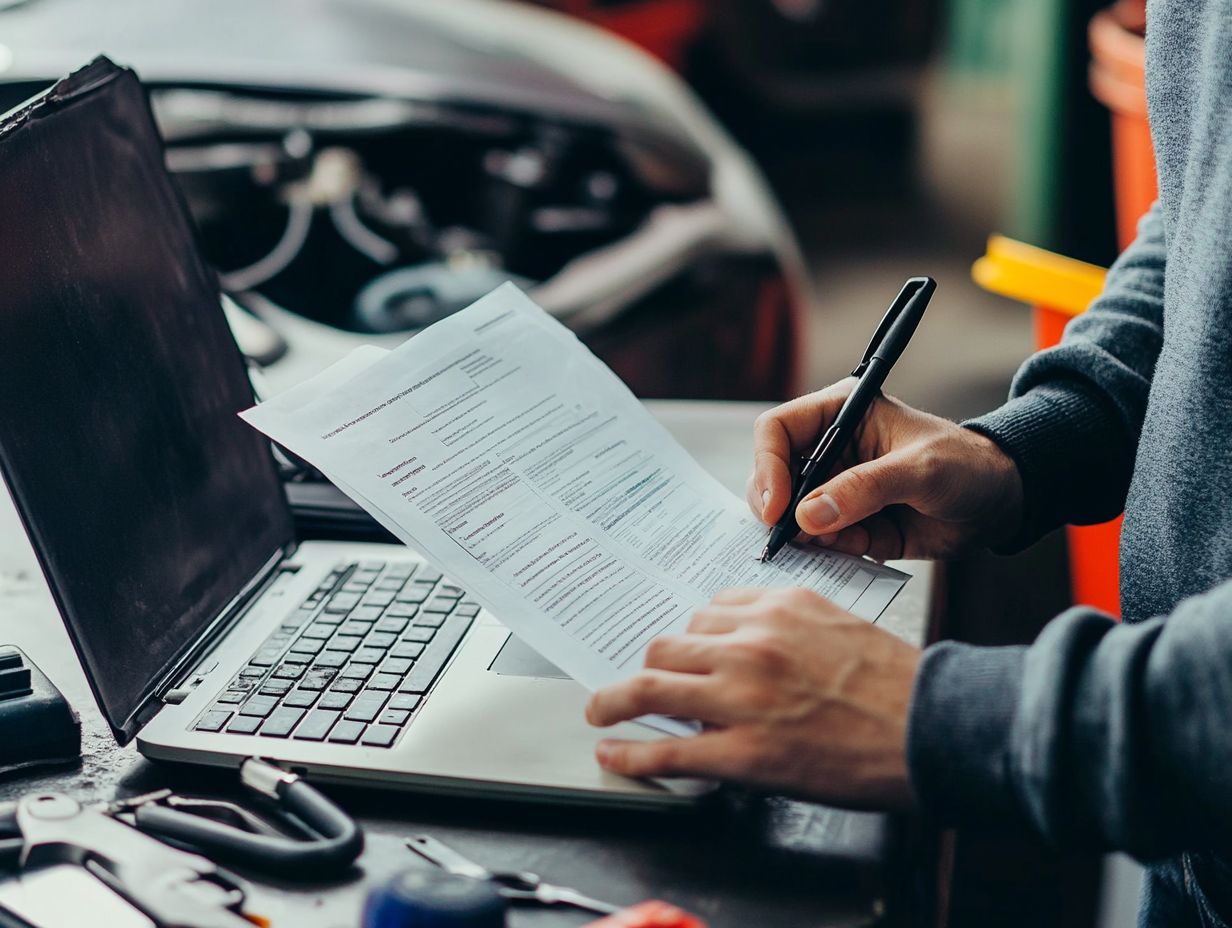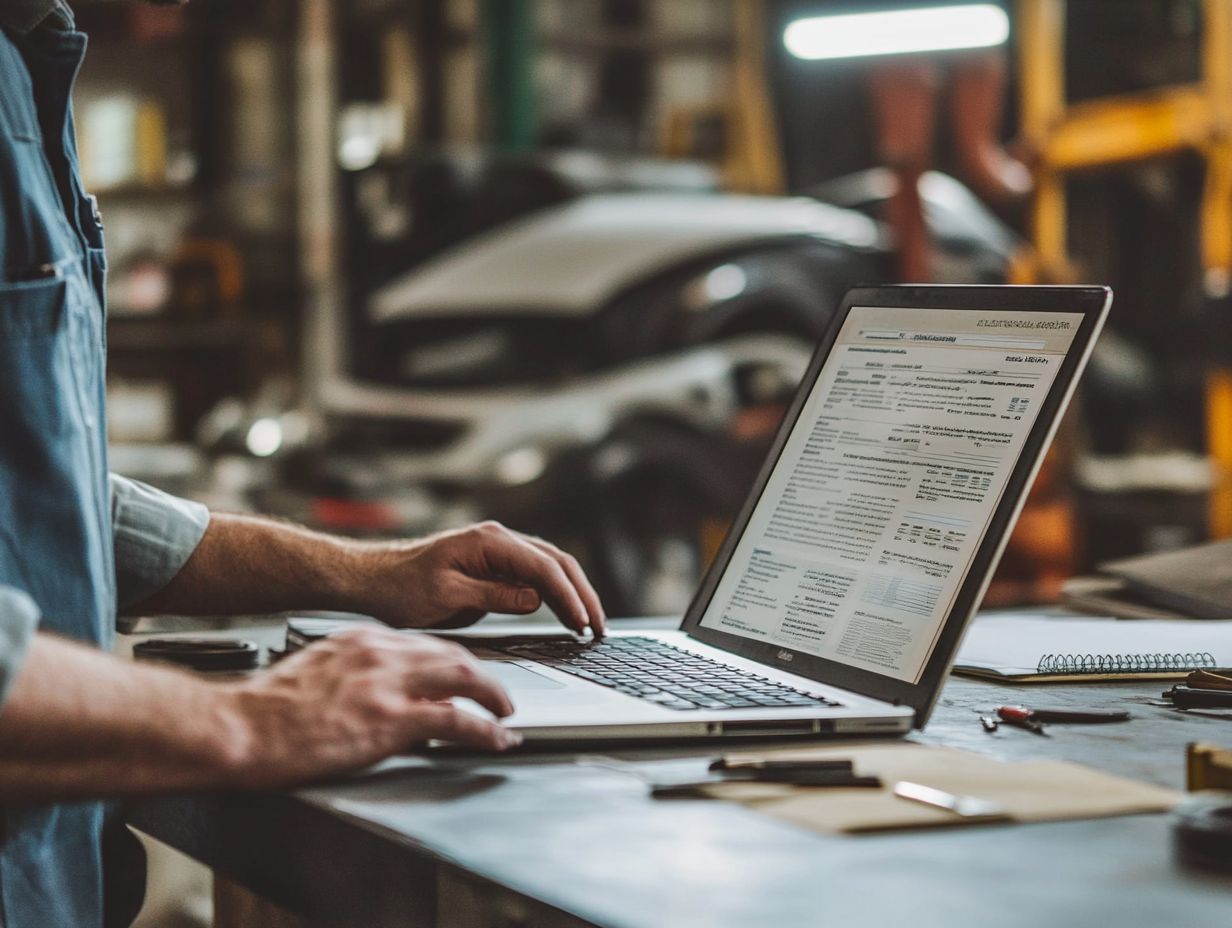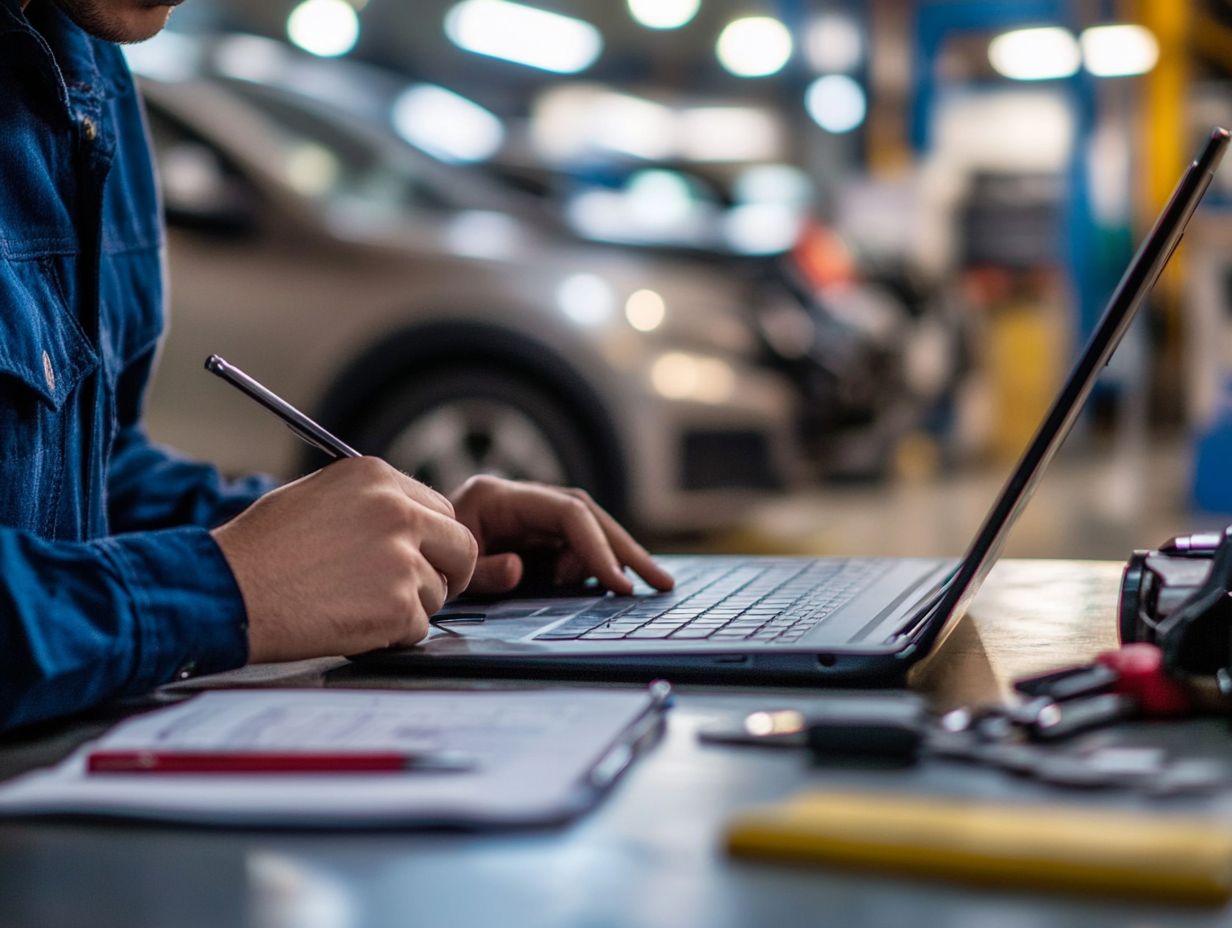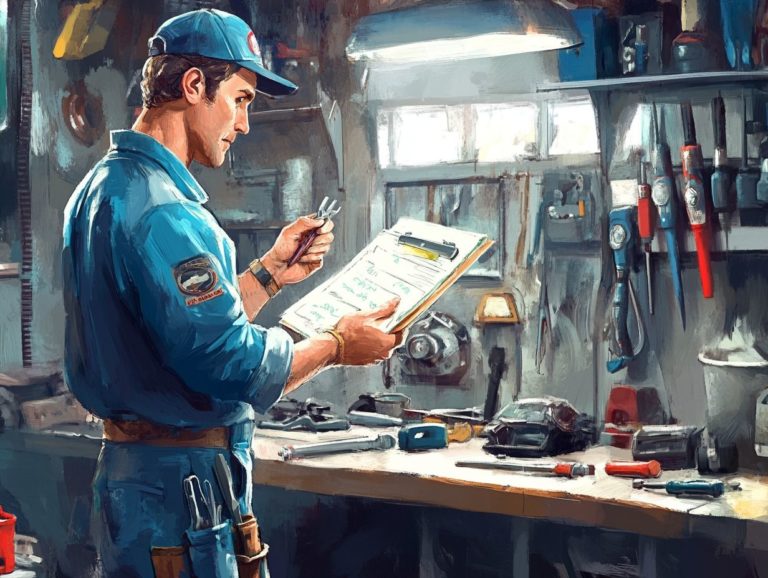How to Handle Common Safety Recall Repairs
Safety recalls are crucial for protecting your well-being, especially regarding vehicles and everyday products.
Knowing about safety recalls keeps you safe and informed! By understanding their importance, you can take necessary actions when a recall affects your items.
This article will guide you through identifying recalls, recognizing signs and symptoms, and navigating the repair journey seamlessly.
You will also find valuable tips on how to prevent future recalls through regular maintenance and proactive tracking.
Stay informed and prioritize your safety!
Contents
- Key Takeaways:
- Understanding Safety Recalls
- Identifying a Safety Recall
- Steps to Take for a Safety Recall Repair
- Preventing Safety Recalls
- Frequently Asked Questions
- What are common safety recall repairs?
- How do I know if my vehicle has a safety recall?
- What should I do if my vehicle has a safety recall?
- Can I continue to drive my vehicle if it has an open safety recall?
- How long will it take to complete a safety recall repair?
- Do I have to pay for a rental car while my vehicle is being repaired?
Key Takeaways:

- Stay informed about potential safety recalls by regularly checking for signs and symptoms and keeping track of vehicle recalls.
- Don t wait! Contact the manufacturer right away if you suspect a safety recall and schedule an appointment for repair.
- Prevent safety recalls by staying up-to-date on regular maintenance and inspections for your vehicle.
Understanding Safety Recalls
Understanding safety recalls is essential for every vehicle owner. These actions, often initiated by manufacturers in response to concerns raised by the National Highway Traffic Safety Administration (NHTSA), ensure that vehicles adhere to federal safety standards.
This protection is vital as it shields consumers from potential hazards linked to safety-related defects. In today s automotive landscape, safety recalls address various vehicle issues ranging from minor inconveniences to serious safety hazards that could impact millions of vehicles on the road.
What are Safety Recalls?
Safety recalls are important actions taken by manufacturers to address safety-related defects in vehicles or their equipment that could pose hazards to you, the consumer.
These recalls begin when a manufacturer uncovers a potential safety issue or when the NHTSA receives reports regarding such defects. The NHTSA plays a key role in investigating complaints and uses the vehicle identification number (VIN) a unique number that identifies your specific vehicle to trace and analyze defect patterns across specific models.
When safety-related defects are confirmed, you could face significant consequences, including an increased risk of accidents, unexpected repair costs, and even a dip in your vehicle’s resale value.
Therefore, grasping the importance of these recalls is paramount, not just for your safety but also for building trust in car makers.
Why are They Important?
Safety recalls play a key role in public safety by mitigating the risks associated with defective vehicles and ensuring that automakers comply with the vehicle safety standards set forth by the NHTSA.
When a safety recall is announced, it highlights manufacturers’ responsibility to protect consumers and emphasizes your essential role in this process as a member of the public.
Recall completion rates serve as a significant indicator of success; they reveal how effectively automakers can connect with affected consumers and motivate them to take necessary action. High completion rates signal a proactive approach to safety concerns, while low rates suggest that risks may still linger on the road.
Your feedback through consumer complaints can significantly impact the recall process, prompting further investigations or initiating proactive measures from manufacturers and regulatory bodies.
By engaging in recall initiatives, you help raise awareness and foster a culture of accountability, ultimately contributing to a safer environment for all road users.
Identifying a Safety Recall
Identifying a safety recall is crucial for you as a vehicle owner. It keeps you informed about potential risks linked to your automobile and ensures you can take the appropriate actions when needed.
The identification process utilizes a range of tools and resources, including the NHTSA’s recall tracker and notifications sent directly to you. These resources offer crucial information on complaints and safety details, enabling you to stay ahead of any potential issues.
Signs and Symptoms

Recognizing the signs and symptoms of a safety recall is crucial for you as a vehicle owner. By doing so, you can effectively address potential safety-related defects before they escalate into serious issues.
Keep an eye out for indicators that might suggest a possible recall, such as unusual noises, warning lights illuminating on your dashboard, or persistent performance inconsistencies.
Pay attention to communications from the manufacturer, which may come in the form of emails, letters, or notifications alerting you to potential safety hazards.
You can easily access vital recall information by visiting official websites. Here, you can input your vehicle identification number (VIN) or search for any recent complaints filed by others. Staying informed about these factors not only ensures your vehicle remains safe but also helps you comply with regulatory standards.
Check These Reliable Resources for Recalls
As a vehicle owner, you can easily check for recalls using various reliable resources. Your primary go-to is NHTSA.gov for comprehensive recall information and updates.
Using the National Highway Traffic Safety Administration’s website is essential for ensuring the safety and well-being of you and your passengers. To get started, navigate to the NHTSA recall section, where you’ll find a recall tracker tool designed specifically for this purpose.
Enter your vehicle identification number (VIN) accurately, as this unique number helps pinpoint any existing recalls relevant to your specific vehicle model. By following these straightforward steps, you can proactively protect yourself and stay informed about any safety issues that may affect your automobile.
Steps to Take for a Safety Recall Repair
When a safety recall is identified for your vehicle, act quickly to ensure your safety on the road!
Start by reaching out to the manufacturer for specific details about the recall process, including necessary actions and timelines to ensure you remain compliant.
Contacting the Manufacturer
Contacting the manufacturer is an essential first step in the recall repair process. They provide critical information about the recall details and the necessary actions needed to ensure your automotive safety.
Be prepared to share relevant specifics about your vehicle, including the VIN, model year, and any symptoms or issues you’ve encountered. Request clarity on the implications of the recall, the available repairs, and the timelines involved to navigate these situations effectively.
Understanding the manufacturer’s communication channels whether through phone, email, or dedicated online platforms can significantly streamline the process. These interactions create a sense of urgency around resolving the recall and enable you to make informed decisions regarding your vehicle’s safety and reliability.
Scheduling an Appointment
Scheduling an appointment for a recall repair should be your top priority to minimize safety risks linked to the identified defect and maintain automotive safety.
Being proactive enhances your driving experience and keeps your vehicle in prime condition. Find an authorized dealer who can effectively handle the specific recall repairs. You can easily do this by visiting the official manufacturer s website or utilizing recall databases to locate nearby service centers.
Ask about recall completion rates at various dealers for valuable insights into their performance and reliability. Once you ve chosen your preferred dealer, schedule the service at a time that works for you to avoid delays, ensuring a smooth and timely repair process.
Don t wait check for recalls now! Have you dealt with a recall? Share your experience with us!
What to Expect during the Repair Process

Get ready for clear communication from the manufacturer about the necessary repairs and the timeline for completion. This clarity is essential for helping you understand the specific issues that need addressing and how these repairs will enhance your vehicle’s safety and performance.
Make sure to pay close attention to any recall notifications or letters you receive, as they contain vital information regarding the recalls affecting your vehicle. Staying informed through the manufacturer s official channels like their website or customer service can further streamline your repair journey.
By being proactive and engaged, you can ensure a smoother experience while enjoying peace of mind, knowing your vehicle is receiving the proper care it deserves.
Preventing Safety Recalls
Preventing safety recalls is crucial for both manufacturers and vehicle owners. By taking proactive measures, you can significantly reduce the chances of safety-related defects arising.
Regular maintenance and strict adherence to vehicle safety standards are key; they enable you to identify potential issues early on, promoting automotive safety and minimizing the likelihood of recalls.
Regular Maintenance and Inspections
Regular maintenance and inspections are essential in preventing safety recalls. They ensure your vehicle operates safely and efficiently while keeping any hidden hazards at bay.
By dedicating time to routine checks like oil changes, tire rotations, and brake inspections you can save yourself from costly repairs down the line. Sticking to a proactive maintenance schedule allows you to catch potential issues early, enhancing your vehicle’s performance and extending its lifespan.
Regular inspections can uncover warning signs that might otherwise slip under the radar, giving you the opportunity to address them before they escalate into serious problems. Prioritizing these practices not only fosters a safer driving environment but also shields you from the disruptions caused by unexpected recalls.
Keeping Track of Vehicle Recalls
Keeping track of vehicle recalls is crucial to stay informed about potential safety issues and ensure that necessary repairs are addressed swiftly.
Being unaware of recalls can expose you to serious safety hazards on the road, which is why it’s essential to utilize resources like the NHTSA s recall tracker. This invaluable tool provides real-time updates on active recalls and offers detailed notifications about the nature of each issue, along with manufacturers responses.
By staying vigilant about updates about vehicle safety, you enable yourself to make informed decisions regarding your vehicle, potentially sidestepping dangerous situations. Keeping current with recall information is a proactive step toward enhancing safety for yourself, your passengers, and everyone else sharing the road.
Frequently Asked Questions
What are common safety recall repairs?

Common safety recall repairs are fixes or replacements requested by the manufacturer or government agency to address potential safety issues in a particular vehicle model. These repairs are usually free of charge and are meant to ensure the safety of drivers, passengers, and other road users.
How do I know if my vehicle has a safety recall?
You can check if your vehicle has a safety recall by visiting the website of the National Highway Traffic Safety Administration (NHTSA) and entering your Vehicle Identification Number (VIN). You can also contact your vehicle’s manufacturer directly to inquire about any open safety recalls.
What should I do if my vehicle has a safety recall?
If your vehicle has a safety recall, don’t wait! Schedule your appointment with an authorized dealership as soon as possible. For more information, check out what to know about car recall notices. The dealership will perform the necessary repairs or replacements free of charge.
For more information, visit the NHTSA website.
Can I continue to drive my vehicle if it has an open safety recall?
No, you should not drive your vehicle with an open safety recall. Recalls aim to fix safety issues, so getting them repaired quickly is crucial for your safety and others on the road.
How long will it take to complete a safety recall repair?
The duration of a safety recall repair can vary based on the issue and parts availability. Most repairs take only a few hours. However, for more complex issues, the dealership may offer a loaner vehicle while you wait.
Do I have to pay for a rental car while my vehicle is being repaired?
If your vehicle needs extended repairs, the dealership often provides a loaner car at no charge. Always check their policy ahead of time to confirm this option.






